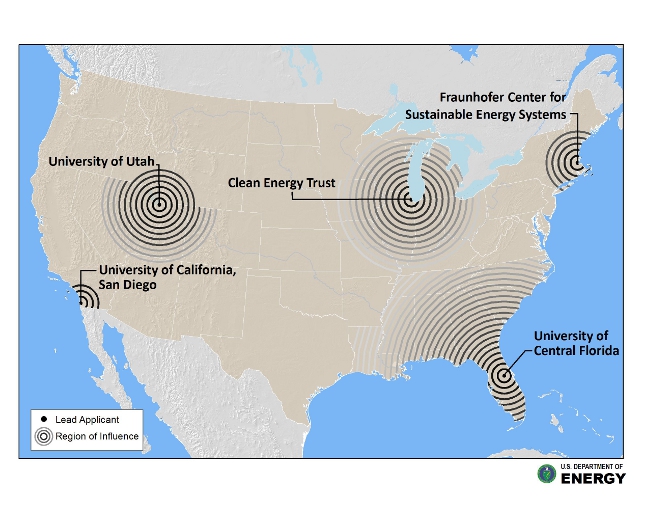Innovation Ecosystem Initiative
In September 2010, the Department of Energy's (DOE) Office of Energy Efficiency and Renewable Energy (EERE) Commercialization Team made five three-year awards to five projects. The goal of the five projects is to build and strengthen "innovation ecosystems" that accelerate the movement of cutting-edge energy efficiency and renewable energy technologies from university laboratories into the market. The five projects are led by universities and nonprofits located in five distinct geographic regions across the United States, and convene more than 80 project partners, uniting the strengths of universities, business, finance, government, research institutes, economic development organizations, accelerators, and national laboratories. The five projects will accomplish such activities as pursuing intellectual property protection for technological innovations; nurturing and mentoring entrepreneurs; engaging the surrounding business and venture capital community; and integrating sustainable entrepreneurship and innovation across university schools and departments.
EERE's fact sheet on the Innovation Ecosystem Development Initiative![]()

Clean Energy Trust (Chicago, Illinois)—is holding an annual "Clean Energy Challenge" business plan competition in collaboration with the Illinois Institute of Technology, Northwestern University, University of Chicago, and the University of Illinois at Chicago and Champagne-Urbana in which Illinois scientists and entrepreneurs will compete for $100,000 in seed funds and business support services.
To learn more about Clean Energy Trust's activites, please read the following DOE blog post:
Fraunhofer Center for Sustainable Energy Systems (Cambridge, Massachusetts)—has established the U-Launch program to connect university projects across New England with R&D services, experienced entrepreneurs, capital sources, and incubator services to help build businesses and raise funds to develop commercial products and successful ventures. The program will combine the capabilities of Fraunhofer with the New England Clean Energy Council (NECEC), the Association of Cleantech Incubators of New England (ACTION) and the Massachusetts Clean Energy Council (NECEC) to streamline commercialization of university-originated technologies.
To learn more about Fraunhofer's activites, please read the following DOE blog post:
University of California, San Diego (San Diego, California)—will hold an annual Regional Energy Innovation Challenge through its William J. von Liebig Center for Entrepreneurism and Technology Advancement and Rady School of Management in partnership with San Diego State University. The selected teams and their technologies will be paired with MBA student mentors and other business support services before three teams are selected to showcase their technologies and commercialization plans to connect with industry and potential sources of capital. Watch a video preview of the CleanTECH Initiative.
To learn more about University of California's activites, please read the following DOE blog post:
University of Central Florida (Orlando, Florida)—is conducting an annual clean energy business plan competition called "Megawatt Ventures" that was open to all Florida universities in the first year, and will expand to include southeastern universities in years two and three. Each year, ten finalists will be selected to receive $10,000 to develop a prototype and utilize a dedicated mentor team; and the grand prize winner will receive $100,000 to launch a new company, an invitation to participate at the NREL Industry Growth Forum, and an interim CEO to guide the company during its earliest phase. In November 2011, University of Central Florida announced the first annual grand prize winner, Mud Power. Led by University of South Florida students Marlyn Colon, Matthias Elliot, Robert Byrne and advisor Dr. Andres Cardenas, Mud Power's technology concept is to use microbrial fuel cells for power subsurface instrumentation deployments. To learn more about the results of the first annual Megawatt Ventures, please read the recent blog post about Mud Power's award.
University of Utah (Salt Lake City, Utah)—has created the Western Regional Energy Commercialization Center (WECC) that will assist participating western universities and research institutions in transferring and commercializing university-developed technologies to industry and start-up companies. The Center will provide resources such as mentoring, proof-of-concept validation, prototype guidance and access to the University of Utah's Technology Commercialization Office and its Venture Bench Program, which provides services to start-up companies to accelerate prototype and product development.
